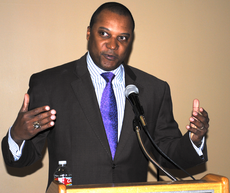Statistically, 700 kids will be drafted and only 50 will make it to the Major Leagues; however, former Nicholls alumnus and baseball walk-on defied the odds and made it, even though his high school did not have a team.Former major leaguer and Nicholls alumnus Darryl Hamilton was the key note speaker at the First Pitch banquet on Saturday and pointed out the biggest difference, besides field conditions and upgrades, between when he played baseball for Nicholls and now.
“It may sound a little weird, but it’s more organized. The community is more involved, and the city of Thibodaux is completely behind these guys,” Hamilton said. “The team has done well in the past few years, so that’s something unlike back then. Football has always been key, and baseball is on the backburner.”
Hamilton was forced to walk-on to the baseball team at Nicholls since he could not be signed due to the fact that his high school lacked a baseball team. However, Hamilton was able to play and came under the direction of coach Mike Knight.
During the banquet, Hamilton shared some of his bad games, and the consequences of the team’s loss.
With all the publicity focused on the Texas Tech incident of a player having to stand in a shed, Hamilton said that he wished that was the consequence of losing 17-1 and playing like the team gave up against Louisiana State University in Baton Rouge.
“We pulled back on campus about 1:30 a.m., and Coach said, ‘to the football field we go.’ We started running 100-yard dashes,” Hamilton said. “After our sixth or seventh one, my roommate wanted to run him over. We ran about five or six more, and I had to pull him away.”
It was years later before Hamilton understood why Knight made the team run because of the loss and that the team played like there was no hope left.
“Don’t ever give up because what you wear on the front of your uniform is important. When you go out and play teams, you have to show them that being a student-athlete at Nicholls State is important,” Hamilton said. “Respect what’s on the front of the uniform and not what’s on the back.”
However, in a game against LSU, Hamilton stood out to one-year LSU coach Skip Bertman, who was also one of the pitching coaches for Team USA for the Pan-American games in Venezuela.
After an outfielder for Team USA was injured, Bertman called Knight and recommended Hamilton for the team. Hamilton played, and that year Team USA beat Team Cuba.
Hamilton finished his college career and immediately was drafted in the 11th round of the 1986 MLB First Year Player Draft by the Milwaukee Brewers.
Despite the Major Leagues being a professional organization compared to Nicholls, a college team, “There’s no big difference. Baseball is baseball,” Hamilton said.
Hamilton was called on a Thursday while he was a player on the Denver Zephyrs, a triple-A team. After receiving the news, he called three people: his mom, his dad and Knight. Knight was Hamilton’s third call because, despite having to run 100-yard dashes at 1:30 in the morning, that is how much Hamilton respected his coach.
Hamilton was drafted as a center fielder, and throughout his career, he found himself playing for the Brewers, Giants, Rangers, Rockies and the Mets. However, Hamilton’s favorite team was the 1996 Texas Rangers.
One of Hamilton’s teammates was Will Clark. Clark played for Mississippi State before being drafted to the New York Giants in 1986. He played for the Giants for six seasons before moving to the Rangers in 1994. Clark was later inducted to College Baseball Hall of Fame in 2006.
Hamilton described baseball as a lot of work and very tiring at points.
“There were times I didn’t think that Clark would get out of his chair, but he would always get up, play and get two or three hits,” Hamilton said. “Seeing guys like that really motivates you to pick up your game.”
Just like Clark motivated Hamilton, Hamilton is also a motivation to younger athletes.
“I get people who come up to me now and say, ‘you were the guy I followed because you made it,'” Hamilton said. “You don’t think people notice you, and when you get someone to say that, then you think to yourself, ‘maybe I did okay.'”
While Hamilton was playing, there were not many guys from Louisiana who made it to the big leagues.
“Most of the guys playing down here didn’t have anyone to look up to and say, ‘you know, I can make it,’ and now it’s different,” Hamilton said. “There are a lot of guys from Louisiana who make it to the big leagues, and it is not uncommon for someone from Nicholls to make it. I think that gives a lot of players hope that they can make it.”
With statistics saying an average of 50 players out of 700 will make it to the Major Leagues, Hamilton thinks that believing you can do it is a major part.
“Always believe in what you can do. If you don’t believe it, nobody else will. I knew I was good enough to play. I didn’t know if I would be able to, but I knew I was good enough to get there,” Hamilton said. “You’re going to get lucky, and you’re going to have breaks now and then, and if you have faith in yourself, you have a good chance of making it.”
One of Hamilton’s goals in life is to do his best and not embarrass the people he loves.
Hamilton now works in the Commissioner’s office for the MLB’s Department of On-Field Operations. One of Hamilton’s jobs is reviewing a fight or an argument on the field and figuring out how to handle it.








